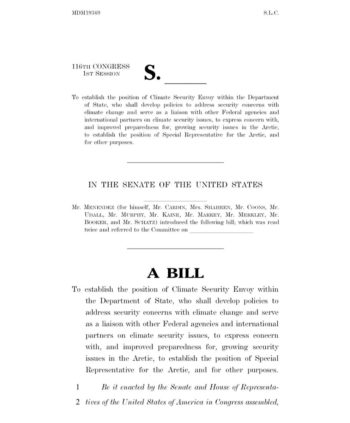
Senators Introduce The Climate Security Act to Address National Security Risks
On Tuesday March 12th Senators on the Senate Foreign Relations Committee introduced The Climate Security Act of 2019 to address the economic, environmental, and geopolitical impacts fueled by climate change. The bill would enhance the U.S. government’s understanding of the relationship between climate change and national security and craft policies to address it.
The Climate Security Act proposes the creation of a Senate-confirmed Climate Security Envoy within the Department of State. The Climate Security Envoy would establish a team of climate security professionals to address climate security vulnerabilities and serve as the primary federal contact for climate security issues.
The Climate Security Envoy would:
- Work with climate scientists and security professionals to conduct analysis and risk assessments of the socioeconomic, geopolitical, and security risks associated with climate change.
- Design climate security policies derived from those findings.
- Develop and coordinate the application of climate security strategies that integrate climate policy seamlessly within the Department of State and across U.S. Embassies.
- Develop and maintain relationships with other nations to address international climate security issues.
The Climate Security Envoy would advise the President of the complexities and dynamics of global security threats exacerbated by climate.
In addition, the bill would re-establish the Special Representative for the Arctic. The current absence of an official dedicated to monitor Arctic security challenges has meant that American interests in the high north are not protected against the gained interests of U.S. adversaries like Russia or China, who are investing heavily in the Arctic.
This bill comes at a time when the security risks imposed by the state of our climate is gaining considerable national attention. Just last week, the American Security Project and The Center for Climate and Security published a joint letter consisting of 58 signatories from former intelligence, national security, and military leaders supporting the efforts of national security professionals to address the security threats of climate change, and to study the science behind it. The letter represented an extraordinary rebuke from a very practical community that is normally focused on addressing external threats, not internal politics.
For comments about the legislation, climate change’s “threat multiplier effect,” and other security risks of climate change, please contact American Security Project’s COO Andrew Holland and Climate Security Program Manager Esther Babson.





